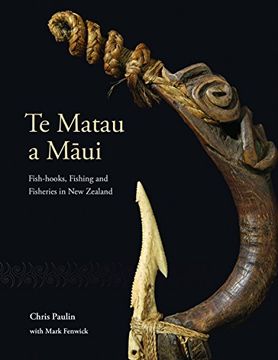Reseña del libro "Te Matau a Māui: Fish-Hooks, Fishing and Fisheries in new Zealand"
Prior to European arrival in New Zealand, fishing was a significant component of Māori subsistence. The abundant fish stocks provided a rich and readily available resource, with methods of procuring fish based on careful observations of generations of fishers. Supplemented by shellfish and birds, the fish stocks were sufficient to provide adequate food supplies, except when seasonal periods of adverse weather prevented harvesting.Māori fished efficiently and sustainably utilizing nets (some over a mile long), traps, pots, spears, and lures, as well as hooks made of wood, bone, shell or stone that were as effective as any modern steel hook. The surplus catch was prepared and stored for later consumption.In the late 1700s, European sealers and whalers traded with Māori, often using metal tools as barter. The superiority of metal for working implements soon became apparent to Māori, who rapidly discarded their traditional tools. By the late 19th century these tools were less evident; however, artefacts were being made by both Māori and Europeans to meet the demand from tourists and collectors.Changes in Māori lifestyles associated with the increasing availability of European agricultural cultivars and domestic animals, as well as urbanization, led to a decline in Māori fishing activity. Another impact of colonization was the loss of indigenous knowledge (mātauranga) surrounding fish-hook design and use. Present-day interpretation of traditional tools including the rotating Māori fishhook design has influenced the custom of wearing hei matau (stylized fish-hooks) as personal adornment.In 1840 the Treaty of Waitangi guaranteed Māori the full exclusive and undisturbed possession of their fisheries. In 1877, Chief Justice Prendergast ruled that the Treaty of Waitangi was "a simple nullity" and that those Māori proprietary rights confirmed in the Treaty were unenforceable against the Crown in New Zealand courts. Establishment of the Waitangi Tribunal in 1975 and recognition of the Treaty as part of New Zealand law in 1988 opened the way for redressing Māori grievances.Māori culture was, and continues to be, dynamic. Māori fishing did not cease when traditional fishing gear was discarded. The development of deregulated commercial fishing in New Zealand waters in the 19th and 20th centuries resulted in a dramatic decline in fish numbers, distribution ranges and sizes. Increased competition for a diminishing resource ensued among commercial, recreational and customary fishers.Te Matau a Māui (Māui's fish-hook) describes traditional Māori fish-hooks and fishing, the development of commercial fisheries and the impact on conservation and management of New Zealand's fisheries resources since European settlement and the Treaty of Waitangi.

